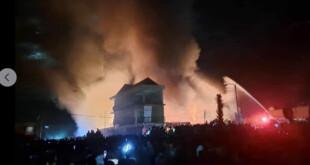(IAAF) –Unlike the men’s event last week, the women’s marathon generally went to the form book.
Mare Dibaba headed into the race as the fastest entrant. Not only that, but her world-leading 2:19:52 clocking from earlier this year was set in China, so it was clear that she would be well suited to the climate.
The conditions were not quite as brutal as the men’s race too, with overcast skies covering the Chinese capital.
Two large packs formed early on with Dibaba among the leading group of about 20 runners, along with all four Kenyan women – defending champion Edna Kiplagat, Helah Kiprop, Jemima Sumgong and Visiliine Jepkesho.
They passed 5km in 17:51 with the Japanese trio of Mai Ito, Risa Shigetomo and Sairi Maeda always present at the front of the pack.
A few athletes tried to break away from the chase pack and join the leaders. Spain’s Alessandra Aguilar was successful in doing so, joining the front group just before the 10km point, which was reached in 35:32.
They continued at a similar pace for the next five kilometres as Portugal’s Filomena Costa rejoined the lead pack with 19 women passing through 15km in 53:21. The race was still wide open. Along with the Kenyan quartet and the Japanese contingent, Dibaba’s team-mates Tirfi Tsegaye and Tigist Tufa were sitting comfortably in the lead pack.
Bahrain’s Lishan Dula was the first of those 19 women to drop out of the lead pack. She was soon followed by Russia’s Alina Prokopeva.
USA’s Serena Burla, meanwhile, was leading a small break-away pack further down the field. With China’s Ding Changqin and Wang Xueqin in tow, they were slowly edging their way towards the front of the field.
Turkey’s Sultan Haydar and Algeria’s Souad Ait Salem were the next to fall behind. Their places in the lead pack were replaced by Burla, Ding and Wang, who were among the 19 women who went through half way in 1:15:16.
A few kilometres later, with 25km passed in 1:29:16 and Tufa leading, gaps were starting to appear at the head of the race. One by one, Lithuania’s Rasa Drazdauskaite, Costa, Ding, Aguilar and Russia’s Alina Prokopeva dropped behind.
Jepkesho was the first of the Kenyans to detach from the leading group. All of a sudden just twelve women were left in front.
They passed 30km in 1:46:50 and then five minutes later defending champion Kiplagat moved to the front of the pack for the first time. The pace began to increase slightly and the lead pack broke up even more.
At 35km, reached in 2:04:04, just six women were left to share the lead: Kiprop, Sumgong, Kiplagat, Bahrain’s Eunice Kirwa, Tufa and Dibaba. Less than a kilometre later, London Marathon champion began to struggle, leaving Dibaba as the sole Ethiopian among the lead pack of five.
Kenya, meanwhile, still had three athletes in contention, giving themselves a chance of replicating their medal sweep from 2011. But with the clock showing 2:20, Kiplagat finally had to concede defeat as she too drifted back.
There were still four women fighting it out for the medals, though, as they approached the Bird’s Nest Stadium. Kirwa moved up on to Dibaba’s shoulder as they turned into the stadium, but as they emerged on to the track it was Kiprop who looked ready to strike. Sumgong, meanwhile, appeared to have nothing left to challenge for a top-three spot.
Responding to Kiprop’s challenge, the diminutive Dibaba dug in and sped towards the finish, crossing the line victorious in 2:27:35. After a 1:15:17 first half, Dibaba covered the second half in 1:12:18 to win Ethiopia’s first ever world title in the women’s marathon.
Kiprop was just one second behind, while Kirwa took bronze in 2:27:39. Sumgong had to settle for fourth in 2:27:42.
With one second between the first two athletes, four seconds between the medal winners and seven seconds between first and fourth, it was the closest marathon in World Championships history.
Kiplagat entered the stadium less than a minute later, taking fifth place in 2:28:18. Tufa finished sixth in 2:29:12, 36 seconds ahead of Ito. Tsegaye was eighth in 2:30:54.




